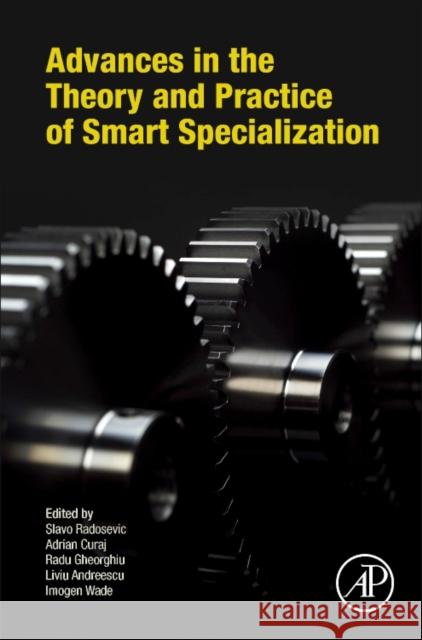Advances in the Theory and Practice of Smart Specialization » książka



Advances in the Theory and Practice of Smart Specialization
ISBN-13: 9780128041376 / Angielski / Twarda / 2017 / 394 str.
Advances in the Theory and Practice of Smart Specialization
ISBN-13: 9780128041376 / Angielski / Twarda / 2017 / 394 str.
(netto: 461,55 VAT: 5%)
Najniższa cena z 30 dni: 478,71
ok. 30 dni roboczych.
Darmowa dostawa!
Wydanie ilustrowane
"Smart specialization strategies are back on the scene. By asking intriguing questions, like how the capacities required for SSS can be developed, the book brilliantly underlines the complexity in applying this new European innovation policy strategy." --Roberta Capello, Politecnico di Milano, Past President of RSAI
"This book brings together a highly impressive list of authors, each providing expert insights into the nature of innovation within regions and the role of public policy in fostering its enhancement and effectiveness. Smart specialization is a concept that captures many contemporary perspectives on regional economic development, and this volume is a state-of-the-art contribution to these discussions." --Robert Huggins, Cardiff University
"The generalization of 'smart specialization' niches, intersecting with lateral Triple Helix interactions, captured by this ovular volume is an 'innovation in innovation' tale well worth your while." --Henry Etzkowitz, Stanford University and University of London, Birkbeck
"This book provides an excellent discussion of current approaches to regional innovation policy. It particularly explains the theoretical underpinnings and practical challenges of the smart specialization strategy." --Michael Fritsch, Friedrich Schiller University
"Very helpful in handling the challenges of Smart Specialisation strategies." --Mari Jose Aranguren, Orkestra-Basque Institute of Competitiveness
1. Assessing EU Smart Specialization Policy in a Comparative Perspective 2. The Economic Fundamentals of Smart Specialization Strategies 3. Managing Self-Discovery: Diagnostic Monitoring of a Portfolio of Projects and Programs 4. Smart Specialization as an Innovation-Driven Strategy for Economic Diversification: Examples From Scandinavian Regions 5. Smart Specialization Policy in an Economically Well-Developed, Multilevel Governance System 6. Innovation Policy in Southern Europe: Smart Specialization Versus Path Dependence 7. Smart Specialization in the US Context; Lessons From the Growth of the Albany, New York Nanotechnology Cluster 8. New Structural Economics and Industrial Policies for Catching-Up Economies 9. Smart Specialization With Short-Cycle Technologies and Implementation Strategies to Avoid Both Target and Design Failures 10. Lessons for a Policy Maker From Real-Life Self-Discovery in Economies With Weak Institutions 11. Transnationalizing Smart Specialization Strategy 12. Can Smart Specialization and Entrepreneurial Discovery be Organized by the Government? Lessons from Central and Eastern Europe 13. From Strategy to Implementation: The Real Challenge for Smart Specialization Policy 14. Entrepreneurial Discovery as a Foresight for Smart Specialization; Trade-Offs of Inclusive and Evidence-Based Consensus 15. Advancing Theory and Practice of Smart Specialization: Key Messages
Slavo Radosevic is Acting Director and Professor of Industry and Innovation Studies at University College London's School of Slavonic and Eastern European Studies. His research is concentrated in the area of the economics of technological change and innovation studies, particularly issues of growth and structural change through innovation systems, entrepreneurship, international business and innovation policy perspectives. He is the author of numerous articles in these fields as well as the co-editor of several books, including, among others, "The Knowledge-based Economy in Central and Eastern Europe: Countries and Industries in a Process of Change" (Palgrave Macmillan, 2006).
Adrian Curaj ia a Professor at Politehnica University of Bucharest, and the holder of the UNESCO Chair on Science and Innovation Policies at the National School of Political Studies and Public Administration. Prof. Curaj is a former Minister of Education, Science and Innovation (2015-2016). He served as the General Director of the Executive Agency for the Funding of Higher Education, Scientific Research, Development and Innovation (2011-2015) and as the President of the National Authority of Scientific Research (2009-2010). Adrian Curaj has experience in designing and managing science & innovation and higher education policies. Prof. Curaj is the co-editor, among others, of Mergers and Alliances in Higher Education: International Practice and Emerging Opportunities (Springer, 2014), Mergers and Alliances in Higher Education (Springer, 2014), Higher Education Reforms in Romania - Between the Bologna Process and National Challenges (Springer, 2014), European Higher Education at the Crossroads: Between the Bologna Process and National Reforms (Springer, 2012).
Radu Gheorghiu is Senior Researcher with the Romanian Academy's Institute of World Economy in Bucharest. Over the past decade he been designing and implementing forward-looking strategic projects in the fields of science and innovation, higher education, and public administration. Dr. Gheorghiu has built and managed large participatory online consultation tools and is the author of several methodological contributions to foresight, scenario-building, and Delphi consultation. He is the current ERAWATCH national expert for Romania and the author of its annual Analytical Country Report.
Liviu Andreescu is associate professor with the Faculty of Administration and Business at the University of Bucharest, where teaches public policy. He previously taught at Spiru Haret University for a decade and a half. He holds a PhD in political science (from the National School of Political Studies and Administration in Bucharest) and an MA in American Studies (University of Bucharest).
Imogen Wade is completing a PhD on the governance of innovation in regions of Russia since the end of the Soviet Union at University College London, London, UK. She was also a research fellow at the Institute for Statistical Studies and Economics of Knowledge in the Higher School of Economics, Moscow (2014-2016).
Her broader research interests include comparative innovation systems, industrial strategy, and technological development. She holds a Master of Philosophy (MPhil) in Politics (Comparative Government) from Oxford University, and previously worked in the World Bank in the US and Russia (2006-2008).
Affiliations and Expertise
School of Slavonic and Eastern European Studies, University College London, UK; Institute for Statistical Studies and Economics of Knowledge, National Research University Higher School of Economics, Moscow, Russia
1997-2026 DolnySlask.com Agencja Internetowa
KrainaKsiazek.PL - Księgarnia Internetowa









